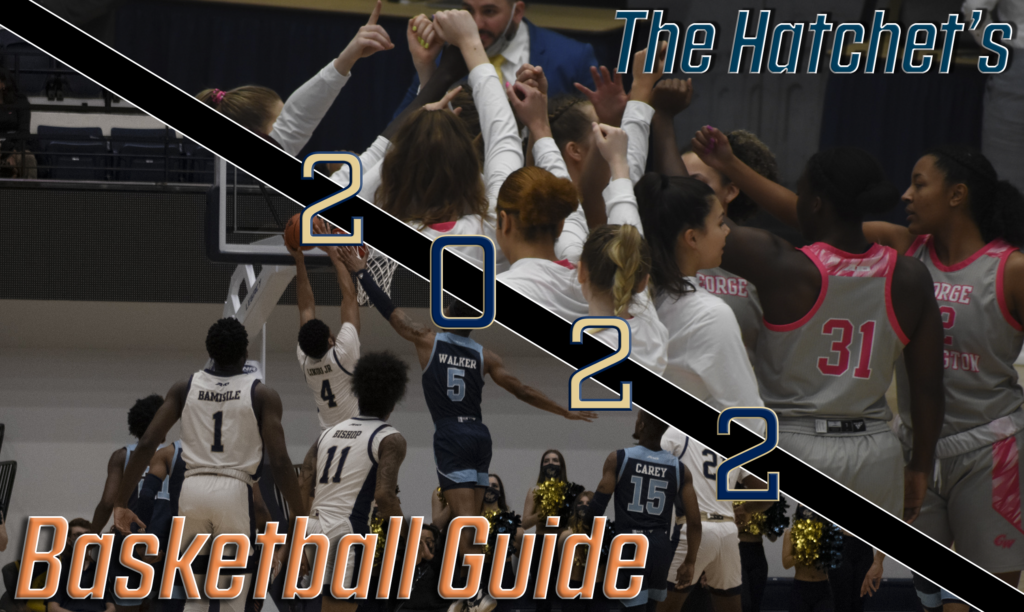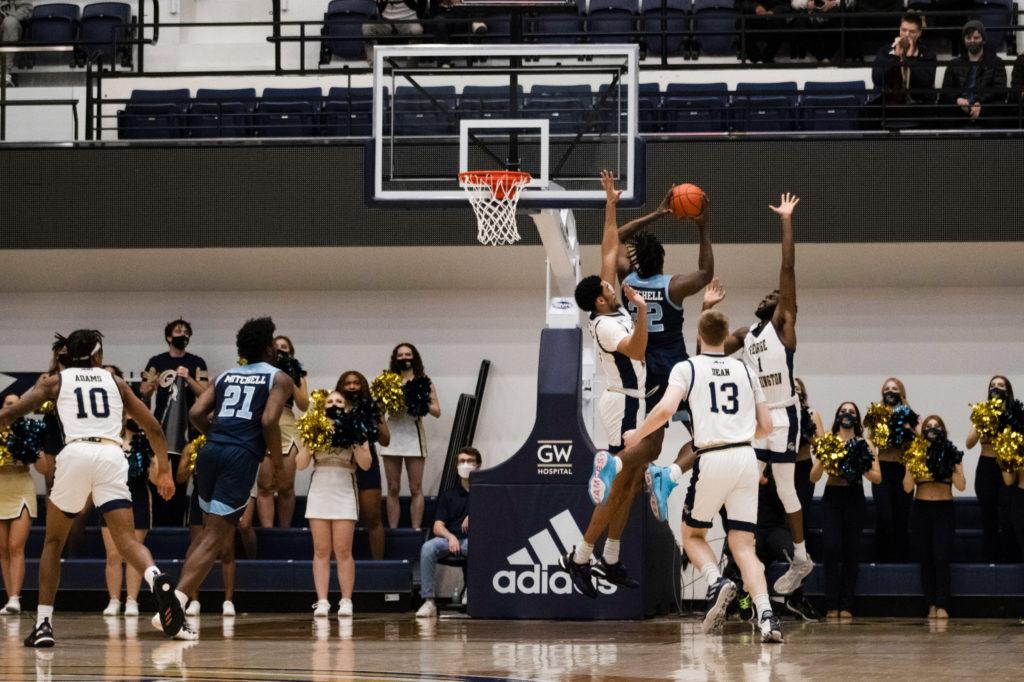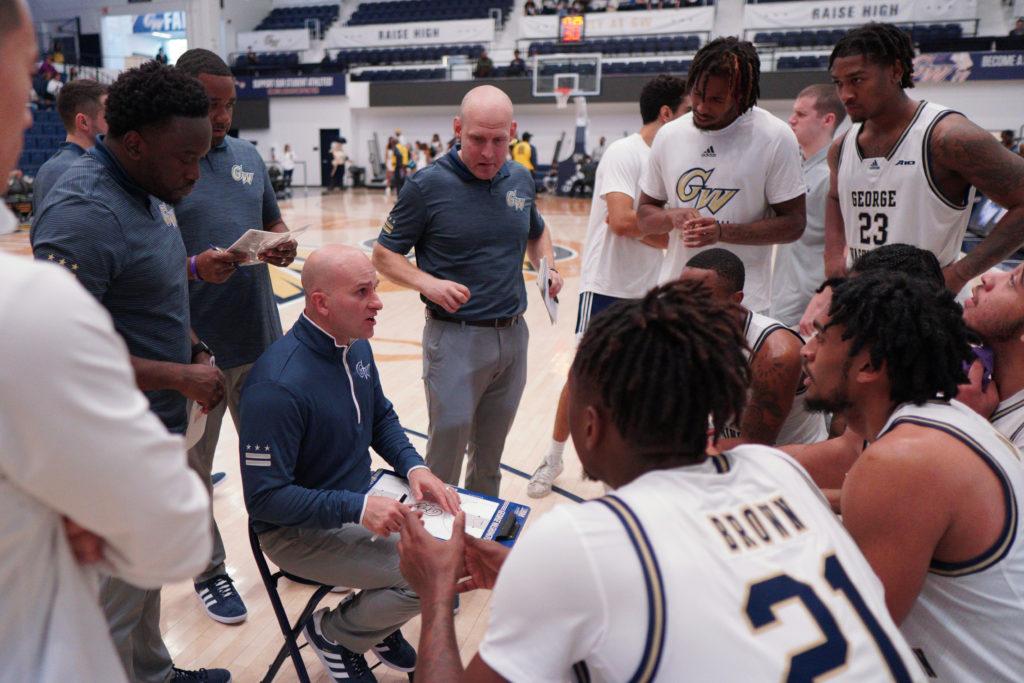The long journey back for GW women’s basketball has begun.
Nine years on the coaching staff at the University of Notre Dame, four years as the associate head coach, NCAA tournament bids in all nine seasons, five Sweet Sixteen appearances and back-to-back trips to the National Championship game – that’s the experience first year head coach Jonathan Tsipis brings to Foggy Bottom this season. And that’s why he’s in charge of the journey.
It’s a resume that invokes experience, consistency and winning. It’s a position of distinction and excellence that was undoubtedly hard to leave behind. But as Tsipis will tell you, that’s in the past now. Everyone – including his team and himself – has a clean slate now. He doesn’t want the players to think about last year’s mistakes or how things used to be done. This is his team now.
“It’s going to be a team that has my sort of enthusiasm and power, and as a guy who wears my emotions on my sleeve, I just want our kids to play with that same sort of enthusiasm,” Tsipis said.
Coming into the 2012 season, Tsipis is staring at a mountain of challenges. He’ll be tasked with returning the program to its former heights – the seasons under former head coach Joe McKeown, who brought the Colonials to multiple top 10 rankings, three Sweet 16 appearances and a trip to the Elite 8 in 1997.
In the immediate future, though, the challenge will first be to bring his new program to an inherited team made up of three fifth-year seniors and three traditional seniors.
The Colonials will draw from the offensive game plans Tsipis helped institute at Notre Dame, he said, and their course of action will revolve around an up-tempo style of play at both ends of the court.
“Personally, I like to play fast; I like to score a lot and get out in transition,” Tsipis said. “So we’ve really tried to build that mind-set and play off of that. That being said, that’s kind of my challenge – to put that together with the current players we have and be able to look at their strengths and how we’ll utilize those.”
Defensively, the formula calls for an aggressive press scheme grounded in the core foundation of man-to-man defense. The goal will be to make opposing teams uncomfortable on both ends – forcing them to play at a speed they are not used to. The Colonials’ play will not need to be complex, Tsipis said, but they will have to execute simple things well and take care of the things they can control.
To prepare the team for this fast style of play all season long, Tsipis has honed in on conditioning and nutrition, working to keep every player healthy for the season’s entirety. The Colonials were plagued by injuries in the last four seasons.
Tsipis has instituted a preseason and practice regimen that fifth-year graduate student guard/forward Tara Booker calls the hardest preseason she has experienced at GW. The team’s practices take place in the full court and are based around the idea of a full-media timeout window. Each drill runs at full speed – at game speed – to set up a competitive win-lose atmosphere.
“His whole motto is he wants all of our practices to be harder than any game we’re going to be in just so we can play at that level,” Booker said.
To help with this transition, Tsipis has crafted a new coaching staff that he sees as being the perfect mesh of the many variables that make up a successful program, including associate head coach Megan Duffy and assistant coaches Shay Hayes and Diane Richardson. Each addition has helped Tsipis achieve the three elements he had envisioned for his staff: coaches who played women’s college basketball, coaches who have a knowledge of the local area and coaches with differing personalities.
Having these three elements, Tsipis said, will not only benefit players, but will be essential for the team when looking toward the future in terms of recruiting.
Duffy, who spent the last three years as part of St. John’s coaching staff, and who played under Tsipis for three years at Notre Dame before that, spoke highly of Tsipis’ vision for the program and of his natural ability to teach players the X’s and O’s of the game.
“He was a terrific teacher,” Duffy said. “I’ve seen in my transition from player to coach, and now working under him, that that is probably his greatest quality – his ability to teach the game and motivate great players.”
The knowledge and experience Tsipis brings to the court were key factors in his hiring six months ago, and in the eyes of his players, it has begun to show dividends.
“I really enjoy his style of coaching,” Booker said. “He wants you to have an understanding of what’s going and isn’t just like, ‘Don’t do that.’ He really explains it and breaks it down. He has a brilliant basketball mind, and I really like that in a coach.”
Even with his intense style of coaching and his emphasis of success on the court, Tsipis believes there’s more to life than basketball.
He understands that basketball is only the two-and-a-half hours a day he has with his team, and that ultimately, there are still 21 and a half hours for them to grow outside the court.
“I think with young players, they appreciate that. That it’s not always basketball 24/7,” Duffy said. “I think [the] players today are staring to realize that he has all the confidence in the world in them, and they trust him in what he’s trying to do to help them.”
And Tsipis’ players are buying into his new system and coaching style. Moving forward, he said, it’s about more than just improving on the court each day. It’s about his players making the entire GW community proud. It’s about remembering what happens in the Smith Center, and then giving the players something to celebrate later in life.
“Whether I get to coach them for one year or for four years, we talk a lot about which chapter are you going to write, what’s the legacy you’re going to leave here at GW,” Tsipis said. “You can’t do anything about what’s happened in your career to this point – you can only worry about how your going to make yourself better, and then more importantly, ‘How is our team going to be the best it can be.’ ”






